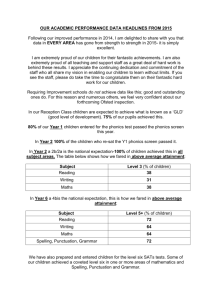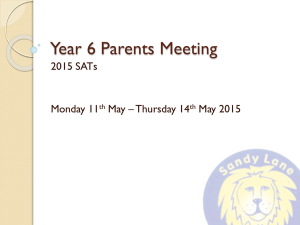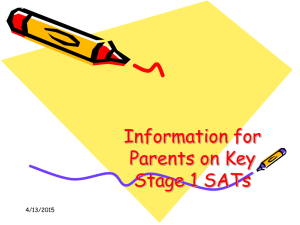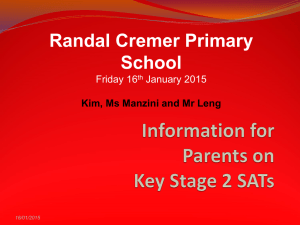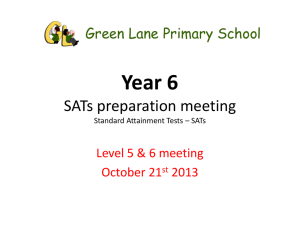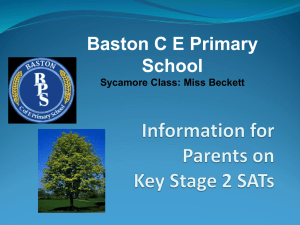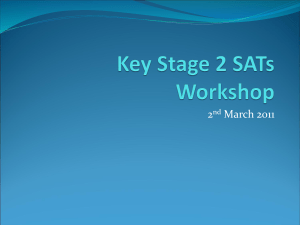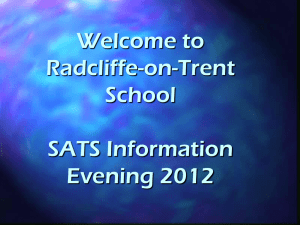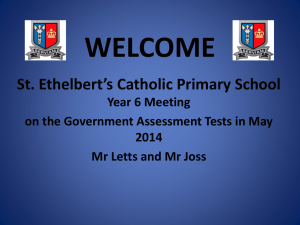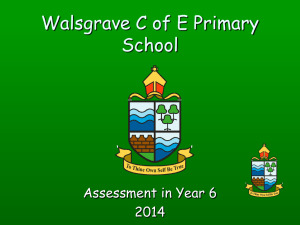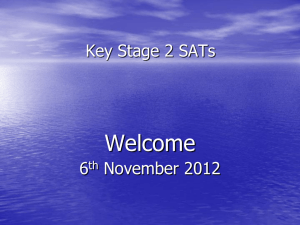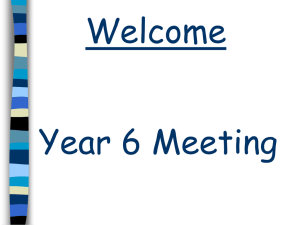Level 6 - Porchester Junior
advertisement
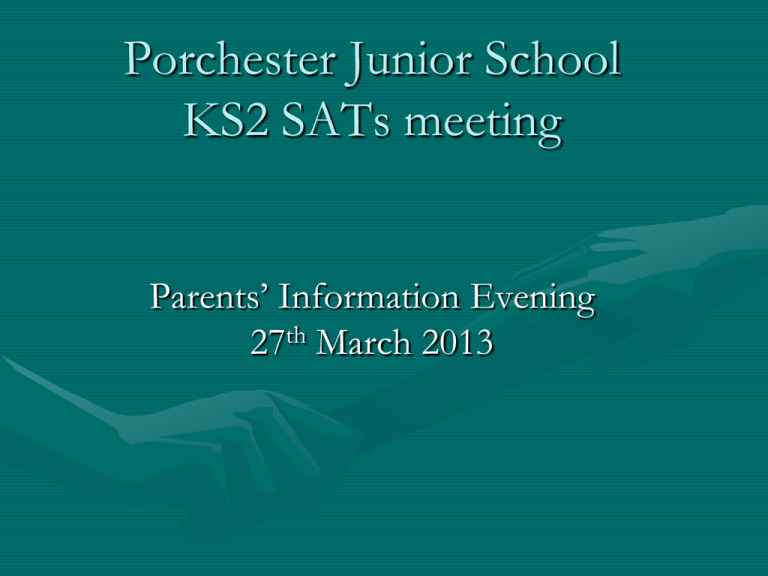
Porchester Junior School KS2 SATs meeting Parents’ Information Evening 27th March 2013 Overview • SATs, or Standard Assessment Tests are statutory end of key stage tests in the core subjects of the National Curriculum: English and mathematics. • The Key Stage 2 tests are designed to test children’s knowledge and understanding of the Key Stage 2 curriculum. • They provide a snapshot of a child’s attainment at the end of a Key Stage. • Papers are sent away for independent marking and returned to the school in June. Final levels are issued in July. When is SATs week? Monday 13th May – Thursday 16th May 2013 Timetable Morning Afternoon Monday 13th May Reading test Level 6 Reading test Tuesday 14th May Grammar, punctuation and spelling test Level 6 Spelling, punctuation and grammar test Wednesday 15th May Maths Paper A Thursday 16th May Maths Paper B Mental Maths Level 6 Maths papers 1 and 2 Types of Tests Maths • Paper A (non calculator) • Paper B (calculator) • Mental maths 45 minutes 45 minutes 20 minutes English • Reading • Grammar, punctuation and spelling 60 minutes 45 mins and 15 mins Pupils are no longer required to take a writing test. Instead the school will submit teacher assessment levels based on the performance of the pupils over the course of the year. What are SAT levels? • Level 3: Below the nationally expected level of attainment for a pupil at the end of Year 6. • Level 4: The nationally expected level of attainment for a pupil at the end of Year 6. • Level 5: Above the nationally expected level of attainment for a pupil at the end of Year 6. A score of just over half the available marks will usually achieve a Level 4 Separate levels are awarded for maths; reading; writing and grammar, punctuation & spelling. Level 6 papers • In 2012 optional level 6 key stage 2 SATs papers were introduced for high attaining pupils. • This year we have decided to put forward a small number of pupils, who are demonstrating attainment above level 5, for these additional tests. • If a child does not pass the level 6 test they will be awarded the level achieved in the regular test. How can you support your child? The hand-out provided offers a range of suggestions for preparing your child for the tests. Key areas are: • • • • • • Read, read and read some more Revise Be positive. Encourage your child. Regular and early bedtimes Breakfast Water bottle Any Questions? Reading test (Level 3-5) • Children are given a reading booklet with three to four texts on the same theme. • The children are given 15 minutes to read the booklet. • They then have 45 minutes to answer approximately 35 questions totalling 50 marks. • Children can refer back to the texts in the reading booklet throughout the tests. • Questions are: shorter closed response items and longer, more open response types. • Questions are worth 1,2 or 3 marks. Reading test (Level 6) • A reading booklet containing around three or four texts based on the same theme which children have 10 minutes to read. • They may refer back to the text to answer questions. • There are approximately 25 questions (Totalling 30-35marks) • They have 50 minutes to answer the questions. • Questions are worth 1,2,3 or 4 marks. Grammar, Punctuation and Spelling • The test will assess children’s ability in grammar, punctuation, spelling and vocabulary. • The results for thistest will be reported separately by the Department of Education. This means no overall English level will be given. • Pupil’s writing will be assessed by Teachers. Maths (Level 3 - 5) • Test A is a non calculator paper, lasting 45 minutes. (40 marks) • Test B is a calculator paper lasting 45 minutes long.(40 marks) • Mental Mathematics test lasts 20 minutes. (20 marks) • Children’s marks from all three tests are aggregated to calculate their overall mathematics level. Maths (Level 6) • Paper 1 is a non calculator paper, lasting 30 minutes. • Paper 2 is a calculator paper lasting 30 minutes long. • Children’s marks from all three tests are aggregated to calculate their overall mathematics level.
